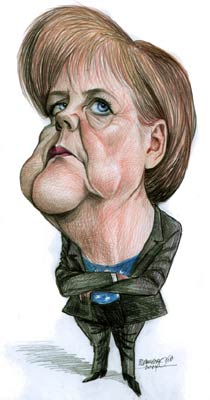
German Chancellor Angela Merkel sounded a bit perplexed a few months ago, in her annual New Year's address. Germany, she noted accurately, is strong and economically successful, and more of its people have jobs than ever before.
Yet the country is plagued by "anxieties and doubts." Many feel confident, many others "left out." There seems to be a "rift running through" her society, Merkel lamented.
The unspoken, but obvious, background was September's German election, in which a new right-wing populist party captured 1 out of every 8 votes, entering Parliament in sufficient numbers to prevent Merkel from forming a majority, though she still rules as a caretaker.
The German right's destabilizing rise, and the wider populist trend it illustrates, has undermined a lot of conventional political wisdom, especially the idea that political moderation flows from economic prosperity.
Germany's economy is the strongest in Europe and was even spared the worst of the 2008-2009 global recession. Yet a significant portion of its people, many more, apparently, than the traditional party system could absorb, are angry just the same - about the influx of immigrants from the Middle East and Africa, about crime and violence, or about what Merkel called the "pace of contemporary life." Now many are angry over the rise of the right.
Solving this puzzle - radical discontent amid economic stability - is Job One not only for Merkel but also for politicians across the developed world.
That very much includes the Democrats and Republicans of President Trump's America, who this fall face what could be the most consequential midterm elections of the postwar era.
Politicians know how to react to a crisis such as the Great Recession, when financial concerns are top of mind and politics can reduce to "it's the economy, stupid."
Yet in today's near-fully healed economy, in which all major regions of the world appear to be growing simultaneously, there's a mismatch between the underlying causes of populist reaction and the programs that politicians promise in response to it.
To be sure, rising populism is linked to the now-familiar narrative about disruption of previously stable industries by globalization and the accompanying loss of economic security for many modestly educated working-class people.
Yet this is not the same as saying that job or income losses led to Trumpism. Rather, a 2016 study of 125,000 American adults by Gallup's Jonathan Rothwell and Pablo Diego-Rosell found that Trump voters had slightly higher incomes than others and were no more likely to be unemployed or exposed to competition from trade and immigration.
Studies in Europe by political scientists Pippa Norris and Ronald Inglehart confirm that basic finding. Right-wing populism has much more to do with feelings of cultural and demographic displacement, and with being looked down upon by cosmopolitan elites, than material privation per se. This is especially true among older, rural whites.
Merkel's speech offered jobs and job training, subsidies for family caregivers and greater equality. She invoked "the key principle of the social market economy - that economic success and social cohesion are two sides of the same coin," as if that principle had not just been called into question by recent events.
Republicans in the United States seek to administer their usual economic medicine - tax cuts, which supposedly create jobs. Democrats, to the extent they have a program, offer a $15 minimum wage and health care. Both parties are maneuvering to buy votes with infrastructure spending.
More, or even more equitable, capitalist economic growth would not necessarily ease angst that may itself be traceable, ultimately, to the disruptive cultural and social impact of capitalist economic growth.
Karl Marx thought economics was the motor of history and that economic class conflict would define modern politics. Yet no one more eloquently described how capitalism breeds reaction as well as revolution:
"Everlasting uncertainty and agitation distinguish the bourgeois epoch from all earlier ones," he wrote. "All fixed, fast-frozen relations, with their train of ancient and venerable prejudices and opinions, are swept away, all new-formed ones become antiquated before they can ossify. All that is solid melts into air, all that is holy is profaned."
Donald Trump won the presidency by validating "the ancient and venerable prejudices and opinions" of his supporters and by promising to resist the profanation of what they considered holy.
In doing so, Trump shattered the long-standing but intellectually inconsistent Republican coalition between free-marketers and cultural conservatives.
At the same time, he triggered a counter-reaction by a younger, more diverse coalition that embraces progressive cultural norms and increasingly considers the Democratic Party its political home. In 2018, these two rapidly changing political bodies collide again, with the future of American government at stake.


 Contact The Editor
Contact The Editor
 Articles By This Author
Articles By This Author